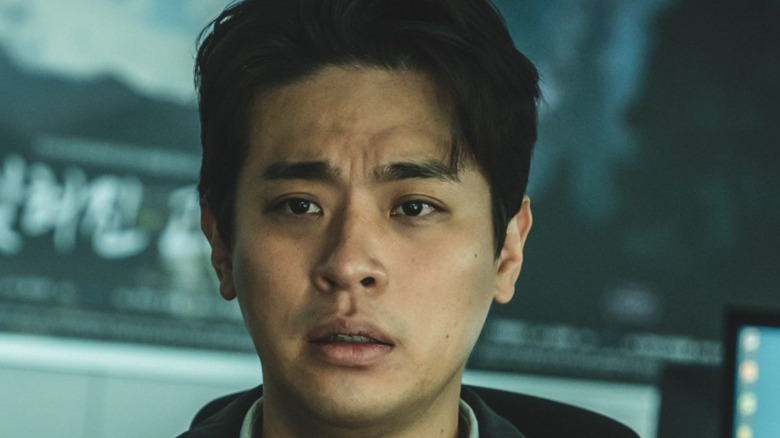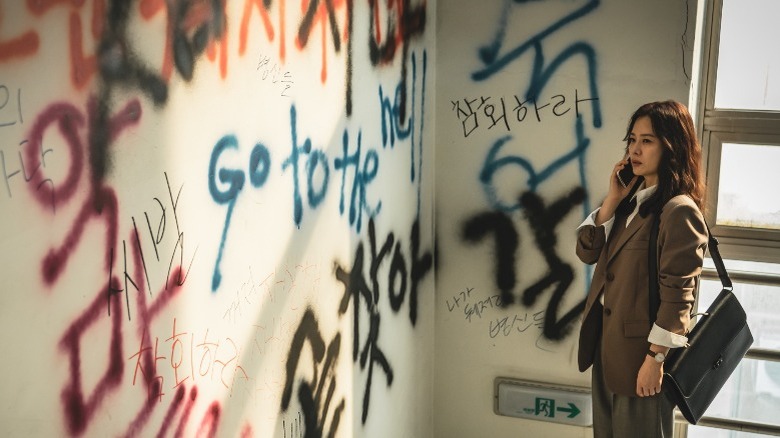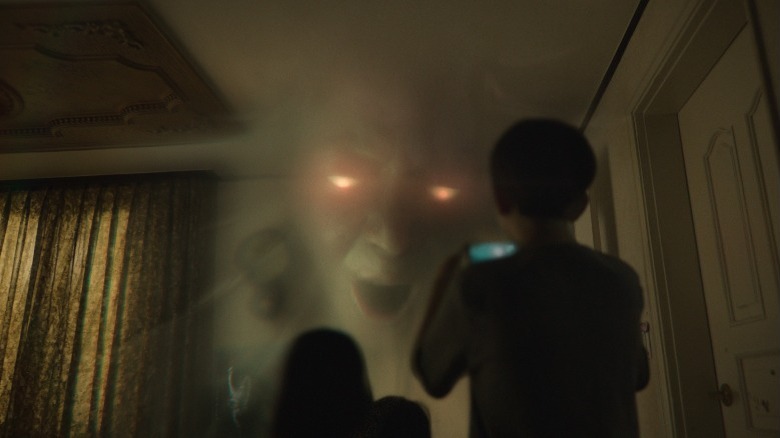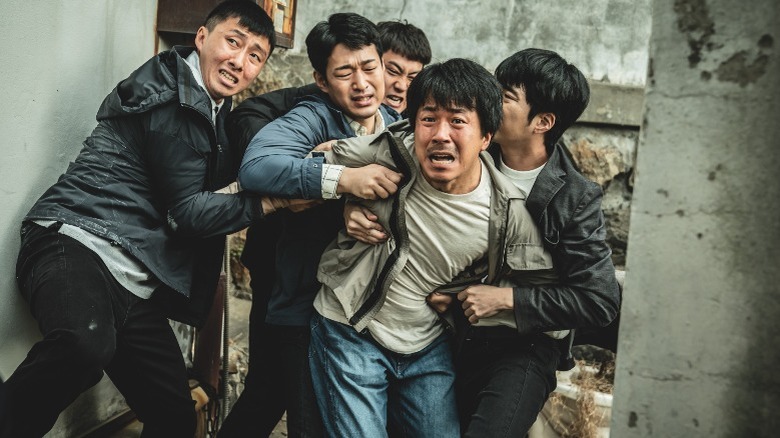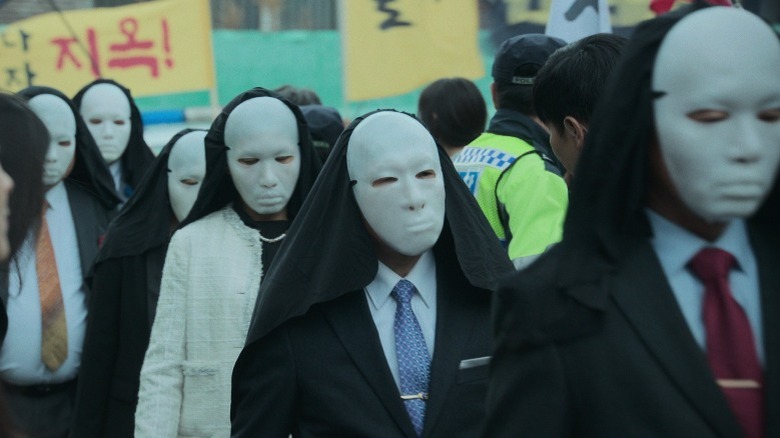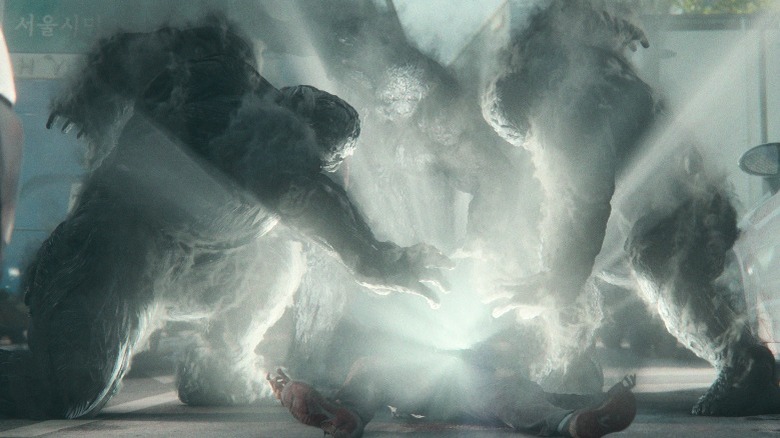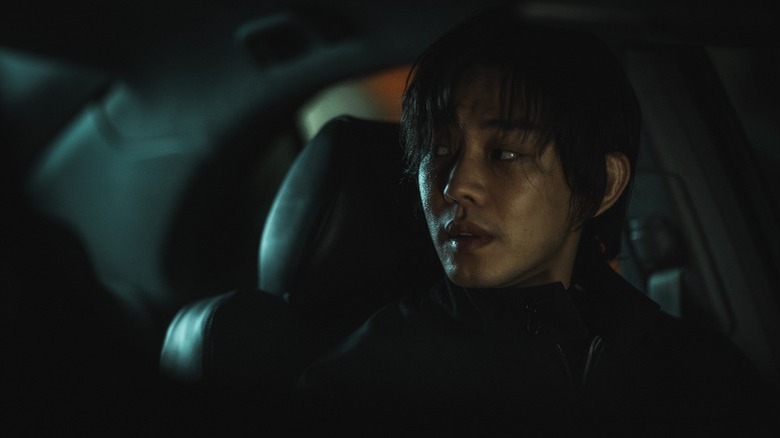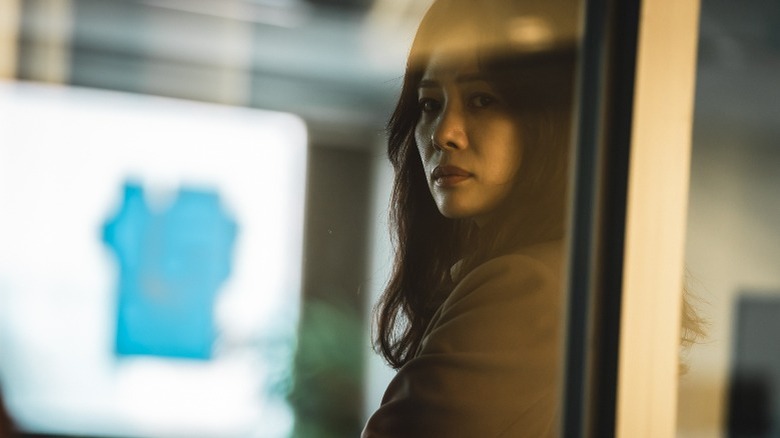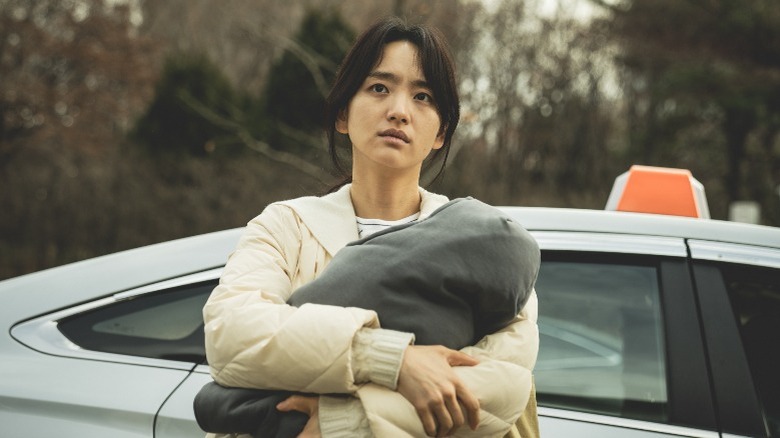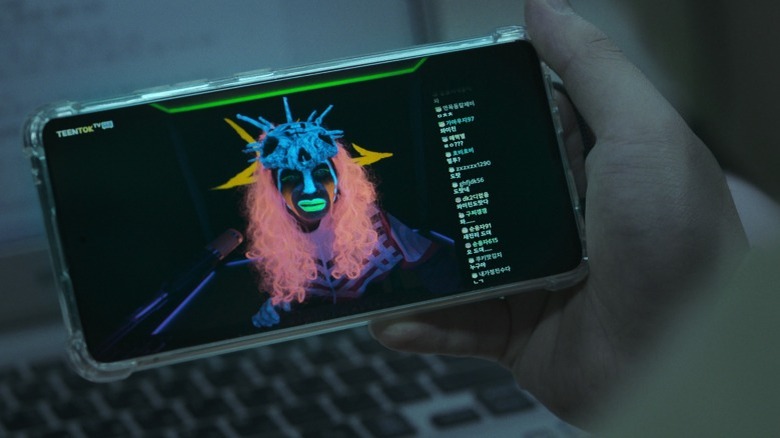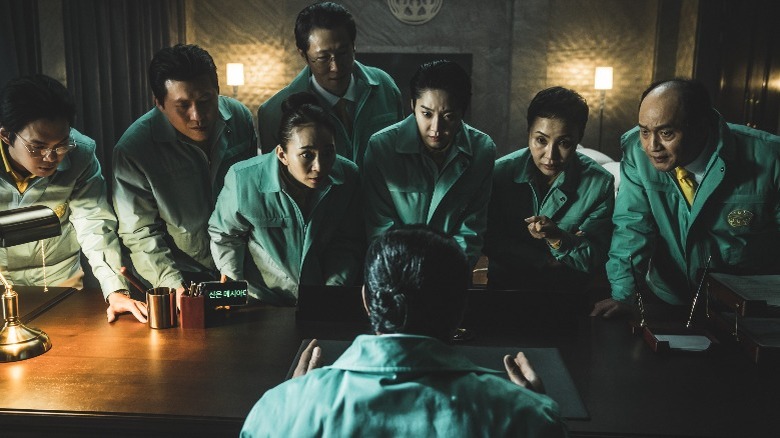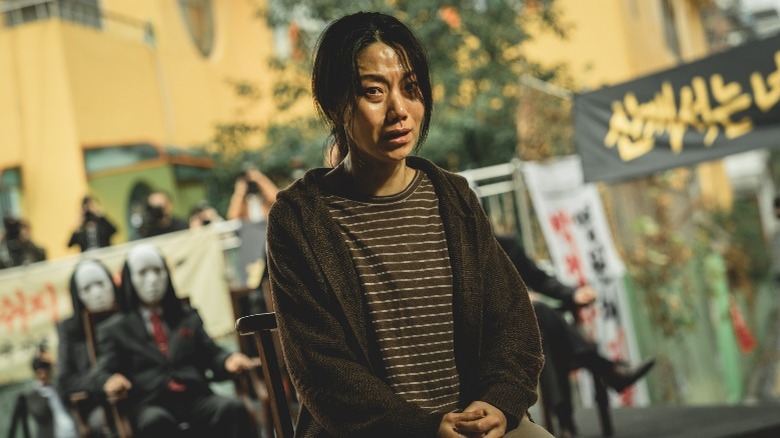The Biggest Unanswered Questions In Netflix's Hellbound
Netflix and Korean television appear to be a match made in heaven. The world cannot seem to stop devouring "Squid Game," Netflix's Korean survival drama. The show has proven to be one of the streamers' biggest successes, having been viewed in a whopping 111 million households. The streaming giant is certainly keen to keep "Squid Game" going, and has ordered a second season. In the meantime, Netflix is clearly keen to keep fans of foreign-language dramas happy, as "Hellbound," an exciting new Korean thriller, has made its way to the platform.
"Hellbound" offers up a terrifying prospect: at any time, an Angel can visit and declare you are bound for hell. This sends the city of Seoul, South Korea, into a widespread panic, but a new religion called the New Truth is determined to guide the population through these challenging times. Directed and co-written by Yeon Sang-ho, director of "Train to Busan" and the sequel "Peninsula," "Hellbound" unleashes plenty of thrills, chills, and surprises on its audience over six exciting episodes.
Though many of the first season's loose-ends get tied up, after you watch it there might be plenty of lingering questions. So, let's explore the foremost unanswered questions in Netflix's "Hellbound."
Warning: this feature contains spoilers for the entire first season of "Hellbound"
Are you really better than a sinner?
"Hellbound" does a really interesting job laying out moral quandaries. Exploring challenging concepts such as what it means to be righteous and what it means to sin, ideas that are directly at the center of the minds of the characters in the show. The series isn't afraid to take aim at organized religion, either, as its not-so-thinly veiled critique largely comes in their examination of the New Truth and Arrowhead. While we don't necessarily learn much about Arrowhead, it's clear that both are extremely determined to follow what they deem to be God's will. Both organizations are unafraid to enact shocking violence on people who aren't what they consider righteous, which begs the question: What makes these arbiters of violence better than those who are hellbound?
We see some horrifying deaths in "Hellbound," but one of the most shocking doesn't take place at the hands of the Executioners, but instead, a gang of humans. In the name of fulfilling God's will, they pull the innocent grandmother of Min Hyejin (Kim Hyun-joo) out of a locked car and beat her to death. The gang believes that they are doing the right thing, but how can murdering an innocent person, simply because she's related to someone deemed sinful, not be a sin? While this is certainly a potent critique on the nature of those who blindly follow faith, it will be interesting to see how, if at all, this is tackled in a second season.
Sure, they're scary, but where exactly are they coming from?
The general concept of the Angels and Executioners is pretty straightforward. At some point, if you are chosen, a (truly terrifying) Angel will appear and decree that you have a certain amount of time left to live — this could be anywhere from a few seconds to multiple years. Then, when the time arrives, the Executioners will come (also terrifying, and as a trio) to kill you in distressingly brutal fashion in order to bound you to hell. There is a lot of time devoted to why these things keep happening, and it is largely a discussion of righteousness and sin. Nobody, however, is asking where, exactly, these things are coming from.
Sure, there's a reason for this, and that's because the New Earth has told everyone that the Angels and Executioners exact God's will, but there is no guarantee or any proof that this is actually the case. There's every chance that these creatures in "Hellbound" are actually agents of Satan, or some equally mythical explanation. There's even the possibility that they are man-made, though all signs point to some sort of supernatural answer. It's one of the many critiques of religion seen in "Hellbound," as it is clear that nobody really knows the answer, and the New Truth could be worshipping the devil for all they know. As frightening and fascinating as Angels and Executioners are, we hope the next season will shine some light on this major mystery.
Will the leaker face punishment?
When Park gets the decree to become hellbound, she receives an offer of three billion South Korean won to stream it live, which she accepts in order to secure her children's futures. It becomes public that New Truth is about to broadcast a demonstration, which sends people into a fury. Who is the person about to die, and what sin did they commit? The knowledge is top secret until it's leaked by a user commenting on the Streamer's live video. But here's the thing: the information is leaked by the male detective (Chase Yi) that works alongside Jin Kyunghun (Ik-June Yang).
It' a major reveal that's played out subtly, but the leak has huge implications, as it puts Park and her children in grave danger. What's worse, it's almost like "Hellbound" completely forgets this happens, as it is never brought up again. We see the other detective in Episode 3 laughing in amazement at the power of the Executioners, which certainly seems to reinforce the idea that he's a follower of the New Truth, but he's still a police officer. We don't really hear or see from the detective again. As there's still so much in this universe to unfold, it would make sense for the police to have a presence in Season 2, which leads us to wonder if this detective will be punished, or perhaps they're setting up a more major character yet to come.
Who are behind the white masks?
One of the strangest moments in "Hellbound" happens during the presentation of Park's hellbound demonstration. People are watching from all over the world to see the event, and the streets and buildings nearby are filled with people hoping to get a look at the proceedings, to confirm for their own eyes whether these Executioners are the real deal. Moments before the demonstration is set to take place, a group of mysterious people wearing white masks are brought in and given front row seats to the proceedings. They are referenced as important people, but then they aren't spoken of again until they re-appear in Episode 5 at another demonstration at the New Truth headquarters.
This leads to a big question "Hellbound" doesn't answer in Season One: Who exactly are these people? The Chairman himself is unmasked, and surely he is the most important person at New Truth. There are a few possibilities here: They could be government officials wishing to stay anonymous, they could be people who paid an exorbitantly high price to attend the event, or they could be part of some ritual the New Earth does that we are not yet privy to.
Hopefully, the truth is something a little more interesting — the masked people are the real folks pulling the strings at the New Truth, and the Chairman appears to answer to them. While we don't know for sure, hopefully, the identities of the masked audience members will be revealed at some point.
Why haven't the Angels and Executioners been noticed before?
Episode 3 brings a number of revelations to the forefront of "Hellbound," perhaps the biggest being its reveal that Chairman of the New Truth Jung Jinsu is actually hellbound himself. Perhaps even more significantly, he received the decree from an angel twenty years earlier, which means that the Angels and Executioners have been around for at least two entire decades. Which leads to the question: if the Angels have been appearing for so long, why are they only just now being noticed?
According to the New Truth, it's something along the lines of contemporary society being less and less righteous than ever before, but that doesn't seem to add up. Since we aren't at all clear on what it means to live righteously, it's hard to say if this is accurate. There seem to be some vague references to Angels and Executioners previously appearing, but why have they been avoiding big cities until now? Is it because they want to be seen now, and they have a message for the world, and could the New Truth be correct?
Will followers of the New Truth find out that Jung Jinsu was bound to hell?
The biggest shock in the first half of "Hellbound" happens in Episode 3, where we learn that Chairman of the New Truth, Jung Jinsu (Yoo Ah-in), received a decree twenty years ago and is now destined to become hellbound. Just as Jung tells officer Jin, if people find out about his death, it could cause unprecedented chaos throughout the world, as it would reveal the truth about the Executioners: it's not just sinners who are up for extermination. Knowing that nobody is safe from sudden death could bring the city of Seoul (and indeed, the world at large) to its knees, and things could be worse than ever.
While Jin makes the decision to not show anyone Jung's demonstration, there are people who know the truth, both in the New Truth and in rival organization Sodo, including Min. As far as the general populace is concerned, Jung simply moved away from Korea, but surely this is something that will weigh heavily on their minds — after all, it's not every day that an important public figure vanishes. With social media (something "Hellbound" uses frequently) anyone can communicate from anywhere, so it doesn't really make any sense that such a recognizable figure has seemingly dropped off the face of the Earth. Revealing the fate of Jung Jinsu could go a long way towards threatening the already shaky stability of Seoul.
Who is the leader of Sodo?
With audiences reeling from the shocking twists and turns of Episode 3, the next episode begins after a significant time jump, as we switch focus from officer Jin and Chairman Jung to Bae Yeongjae (Park Jeong-min), a TV producer who we find working on documentaries about the New Truth. Through various circumstances, Bae meets sociology professor Gong Hyeongjun, who introduces bae to Sodo, an organization determined to stop the New Truth. They find and hide people who have received a decree, before the New Truth can get a hand on them and livestream their demise to further their religious agenda. Sodo is determined to do noble work, as they know the truth about Chairman Jung and want to give people, and especially their families, peace of mind away from the public eye.
Arrowhead thugs speculate that either Gong or Min is the leader of Sodo, but Gong gets murdered by Arrowhead, and Min claims she is merely a lawyer, so the truth is very much up in the air. If it is Min, this could give her an exciting role in a second season, but a new character could certainly be introduced to lead Sodo in the battle against New Earth. Learning who is behind the noble Sodo firm would certainly offer some exciting future opportunities for "Hellbound," as a figurehead for Sodo could provide an exciting rival for the Chairman, and it would be thrilling to see them face off.
Stopping the Executioners
Episode 6 of "Hellbound" offers a major revelation: a baby decreed hellbound is spared, with the child's parents taken instead. This is a considerable upheaval to everything we've seen before, as previously once someone was decreed hellbound, it was impossible to stand in the way, and their death was guaranteed. The demonstration drew a large audience of people, so there are a considerable number of witnesses to this shocking twist.
A lot depends on how the New Truth chooses to react to the event, but that will not necessarily stop word of mouth from running rampant while people look for the truth. The possibility that one can sacrifice themselves to save another has pretty enormous implications for the people of Seoul. Will people try and force others to die, in order to save themselves? Will people deemed sinners who do not receive a decree be forced to sacrifice to save the righteous? The first season of "Hellbound" spends a lot of time focusing on the idea of righteousness and following orders, and this change in the way Executioners function could have a major impact on future episodes. Above all, the sacrifice gives hope — perhaps there is some way to stop the Executioners, after all.
The mysteries of Arrowhead
We learn about the Arrowheads from the streamer, who says that when God launches an arrow, the arrowheads should strike the target. They preach violence — but who is doing the preaching, and what is their actual connection to the New Truth? Are they a subdivision? This seems like the most likely option, but it's never really confirmed how they work together. That particular theory is upended somewhat when Deacon Yuji asks a coworker if he has connections to Arrowhead, which certainly seems to suggest that they are not officially linked to New Truth. Surely if they were, someone as high in the ranks as Deacon Yuji would be able to make contact himself.
"Hellbound" takes a lot of care in building a version of Seoul overwhelmed by Executioners, particularly when it comes to the New Truth. The Arrowhead organization, however, doesn't get nearly the same attention. It's clear they have a penchant for violence, and at one point they even storm the police office. Still, their intentions are murky, and the purpose of the organization even more so. Hopefully, a second season of "Hellbound" would take time to properly establish more specifics about the Arrowhead and how they differ from the New Truth.
How do the New Truth rebound from this?
At the beginning of "Hellbound," New Truth has a considerable following, but as the show goes on and demonstrations become commonplace, the New Truth grows to become a dominant force in South Korea, and likely the entire world. They preach principles of righteousness, and livestream demonstrations of sinners becoming hellbound, to reinforce their values to the disciples. After covering up the death of their chairman Jung Jinsu, they continue to amass followers, but the revelation that a baby has been declared hellbound threatens to ruin their image.
Though countless members of the public witnessed the attempted ceremony of Bae and Song's baby, the pair ultimately were sent to hell instead of the child. If the New Truth is wise, they'll use this as an opportunity to claim that Sodo was lying the whole time and manipulating footage, as the baby was spared. They could argue that this was always meant to happen, and the baby was never really at risk, as no baby could be a sinner. However, now that Yujin and his level-headed approach has been taken, it's difficult to imagine the Chairman handling this serious matter in a reasonable way, and it would not be surprising if his instincts turn violent, resulting in damage to the New Truth.
We need to talk about the final scene
"Hellbound" has a riveting tendency to save its biggest revelations for late in the game, and none are bigger than the final scene of Season One.
We return to the place where Park's demonstration occurred and she was sent to hell. As the camera slowly zooms in on the charred remains of Park, things start to shake violently as something unfathomable occurs — the remains come together and form a human body once again. At first, it seems as if this could just be a demon spawning, but in the shocking final seconds of "Hellbound," it's clear that the demonstration has been reversed — and a naked Park appears in the fetal position, reborn.
Is it all over? Are the Executioners returning everyone to earth, or is Park simply a special case? If so, why? One could argue that Bae and Song changed the way the Executioners function when they sacrificed themselves to save their baby, just moments after the Streamer is massacred by the Executioners in an especially brutal fashion. One thing that this mind-blowing final scene sets up is a message that everything the audience thinks they understand about being hellbound is wrong. This moment will undoubtedly have enormous impact on the New Truth, Arrowhead, and the public at large — and we can't wait to see how it all turns out.
